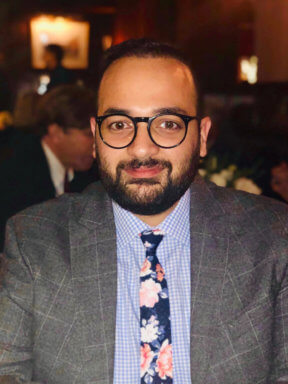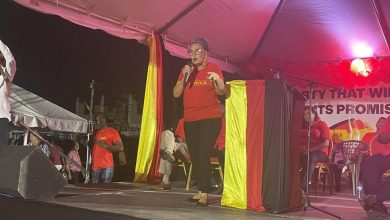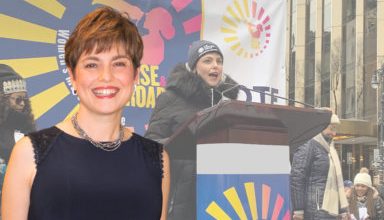Caribbean American pols, immigration advocates condemn judge’s ruling

Caribbean American legislators and immigration advocates on Monday strongly condemned a judge’s ruling that struck down a law that would have permitted Caribbean and other noncitizens to vote in local elections in New York City.
Justice Ralph J. Porzio in Richmond County State Supreme Court in Staten Island ruled on Monday that the new law conflicted with constitutional guidelines and state law, pointing out that only eligible citizens can vote.
The legislation, which was enacted by New York City Council in December, would have permitted over 800,000 permanent legal residents and immigrants with work authorization, including Caribbean nationals, to vote for elective offices, such as mayor and City Council.
“Months ago, after years of it being denied, New York City restored the right to vote in municipal elections regardless of immigration status with legislation I was proud to co-sponsor, an essential step towards building a true democracy in our city. Today, the state Supreme Court seeks to once again revoke that right and disenfranchise hundreds of thousands of permanent New York City residents from having a voice in the decisions that shape our city – and choosing the leaders who make those decisions,” New York City Public Advocate Jumaane Williams, the son of Grenadian immigrants, told Caribbean Life.
“Federal citizenship should not be a prerequisite to participate in local democracy,” added Williams, a candidate for Governor of New York in Tuesday’s Democratic Primary. “As recently as 2002, noncitizens voted in school board elections. In a city like New York, this court ruling will silence the people and communities that are often most impacted by the decisions of those in power.
“Days after the John R. Lewis Voting Rights Act was signed in New York State in opposition to a rising tide of voter disenfranchisement across the country, the court’s ruling undercuts that mission and belies New York’s role as a supposed progressive beacon,” he added. “It must be immediately appealed. New York is a city of immigrants, and to advance our city, we must advance our vote.”
Queen Borough President Donovan Richards, Jr., who traces his roots to Jamaica, noted that the recently passed New York City law would have afforded noncitizens the ability to vote in municipal elections, beginning next year.
“Well over 1 million Queens residents were born somewhere other than the United States, but many of these hard-working taxpayers have been senselessly barred from having a say in who represents them in city government. Today’s ruling is yet another attempt to further disenfranchise our immigrant neighbors and erase years of tireless advocacy to ensure our government is fully representative of the people it serves,” he said.
“Our city is a stronger, fairer place when our immigrant communities are brought into the political process, allowing our diverse neighborhoods to fully exercise their power. I fully support any appeal of this ruling to a higher court.”
“The court’s decision to strike down the historic ‘Our City, Our Vote’ legislation (Local Law 11-2022) is a severe blow to our city’s democratic process and its institutions,” said New York City Council Member Crystal Hudson, whose grandmother hailed from Jamaica.
“Across the five boroughs, there are close to one million people who pay taxes and contribute to the wellbeing of our communities, yet have no say in municipal elections,” added the representative for the 35th Council District in Brooklyn. “Fighting to include these voices in our electoral process is a responsibility we cannot shy away from.
“In light of this decision, we must continue to organize and advocate for the disproportionately Black and brown New Yorkers whose voices are not taken into account,” Hudson continued. “Until we secure a just, equitable, and truly representative future, we will not stop fighting to include all New Yorkers.”
Murad Awawdeh, executive director of the New York Immigration Coalition (NYIC), an umbrella policy and advocacy organization for more than 200 immigration groups in New York State, said the decision to overturn Local Law 11 by a lower court in Staten Island “comes as no surprise to us, because the Republican opponents to the law specifically placed their lawsuit in a court they knew would be favorable to them.
“In spite of today’s court decision, we will keep fighting to ensure that the nearly one million New Yorkers who are building their lives here and are investing in our communities can have a say in their local democracy,” he said. “We remain firm in our certitude that municipal voting is legal and plan to support the appeal of this judge’s decision.
“We refuse to allow today’s verdict to further the disenfranchisement of Black and brown communities in New York City,” Awawdeh affirmed.
Susan Stamler, executive director, United Neighborhood Houses, a housing group, said: “We are deeply disappointed in the Richmond County Supreme Court’s decision today around Local Law 11.
“United Neighborhood Houses has supported expanding the right to vote to immigrants for over a decade, and will continue to support this law throughout the appeals process,” she said. “We must make sure that more New Yorkers have a say over what happens in their neighborhoods and cannot let this verdict silence the voices of immigrant New Yorkers.”
CAIR-NY Legal Director Ahmed Mohamed said his group was “deeply disappointed by the court’s decision to invalidate Local Law 11—a law that represented the largest enfranchisement of voters in our city’s history in over a century.
“We believe this case was wrongly decided, and the decision strikes at the core of our democracy and values as a city of immigrants,” he said. “CAIR-NY and our legal partners will appeal this decision, and we are confident that the appellate courts will restore the right to vote for all immigrant New Yorkers enfranchised by Local Law 11.
“CAIR-NY and the thousands of Muslim New Yorkers impacted are not deterred and remain firm in our commitment to immigrant voting rights,” Mohammed affirmed.
In siding with the plaintiffs, including Staten Island Borough President Vito Fossella, Justice
Porzio said the measure violated New York State election law and the municipal home rule law.
“The New York State Constitution expressly states that citizens meeting the age and residency requirements are entitled to register and vote in elections,” he wrote in his ruling. “There is no statutory ability for the City of New York to issue inconsistent laws permitting noncitizens to vote and exceed the authority granted to it by the New York State Constitution.”
Joseph Borelli, a Republican councilman from Staten Island and one of the plaintiffs, hailed the court’s decision.
“Today’s decision validates those of us who can read the plain English words of our State Constitution and state statutes,” he said. “Noncitizen voting in New York is illegal.”
Andrew Giuliani, the son of former New York City Mayor Rudolph Giuliani and a Republican candidate for Governor of New York, commended the Richmond County Supreme Court’s decision “to uphold Article II Section I of the New York State Constitution, which clearly outlines the fact that only citizens of the state of New York have the right to vote.
“This decision is an important step in building trust in our elections again,” he said in a statement on Monday. “Staten Island again leads the way in common sense, and I hope they speak loud and clear at the polls tomorrow.”





